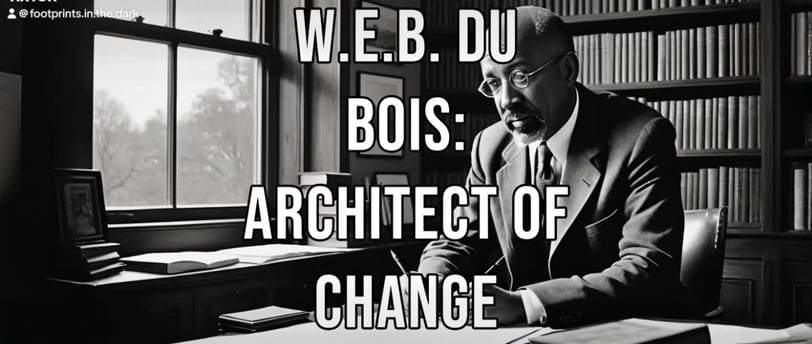A Journey Through Du Bois's Intellectual Legacy
Explore the transformative legacy of W.E.B. Du Bois, the pioneer who reshaped our understanding of race, class, and power. Ever wondered how one man's ideas could challenge and change societal norms? We promise you'll learn about Du Bois's groundbreaking journey from his Massachusetts beginnings to the harsh realities of Southern segregation, which fueled his commitment to social justice. Join us as we illuminate his academic achievements, including becoming the first African-American to earn a PhD from Harvard, and his influential contributions, such as "The Souls of Black Folk," which introduced the powerful concept of double consciousness. We'll scrutinize his visionary disagreements with Booker T. Washington, advocating for the "Talented Tenth" to lead societal transformation, and explore his global vision through Pan-Africanism.
Footprints In The Dark
10/19/20242 min read


The podcast episode "Transforming Society: Du Bois's Lasting Legacy" delves into the profound influence of W.E.B. Du Bois on modern society. It takes listeners on an intellectual journey through Du Bois's life, examining how his pioneering ideas on race, class, and power continue to resonate today. The episode begins by shedding light on Du Bois's early life in Massachusetts, where he was raised in a relatively tolerant environment. This contrasted sharply with his experiences in the segregated South, which ignited his lifelong commitment to social justice. As the first African-American to earn a PhD from Harvard, Du Bois used his academic prowess to challenge racial inequality, employing rigorous scientific methods to bring about change.
One of the key concepts discussed in the episode is Du Bois's notion of "double consciousness." This term describes the internal conflict experienced by African-Americans who must navigate their dual identity as both Black and American. This powerful idea remains relevant, as many people still grapple with similar challenges today. Du Bois's disagreement with Booker T. Washington is another focal point, highlighting his belief in the "Talented Tenth" leading societal transformation. Du Bois argued for dismantling oppressive systems rather than accepting gradual change, advocating for a more radical approach to achieving equality.
The episode also explores Du Bois's global vision through Pan-Africanism. He recognized the interconnected struggles of people of African descent worldwide and worked to unite them against colonial oppression. His efforts culminated in organizing Pan-African congresses, which were groundbreaking at the time and continue to inspire movements for global unity and civil rights. The episode emphasizes how Du Bois's belief in the power of knowledge to combat prejudice transcends borders, urging listeners to engage in difficult conversations and amplify marginalized voices.
As the episode progresses, it reflects on the enduring impact of Du Bois's work, offering a framework for understanding modern identity and social justice. The hosts challenge listeners to consider their own role in the ongoing struggle for equity and justice, drawing inspiration from Du Bois's unwavering commitment to these ideals. By highlighting his legacy, the podcast underscores the importance of education, critical thinking, and activism in creating a more just world.
In the later chapters of Du Bois's life, the episode discusses his radical shift towards socialist ideals, recognizing the flaws inherent in capitalism and its links to racial and class-based oppression. This bold stance during the Cold War era led to significant challenges, including political persecution. However, Du Bois's relocation to Ghana in his later years symbolizes his enduring dedication to Pan-Africanism and his belief in a united front against global oppression.
Overall, the episode "Transforming Society: Du Bois's Lasting Legacy" is a powerful exploration of W.E.B. Du Bois's impact on both historical and contemporary society. It serves as a reminder of the ongoing struggle for social justice and the importance of carrying forward Du Bois's legacy with purpose and determination. By engaging with his ideas and contributions, listeners are encouraged to continue the fight for a more equitable and just world.
